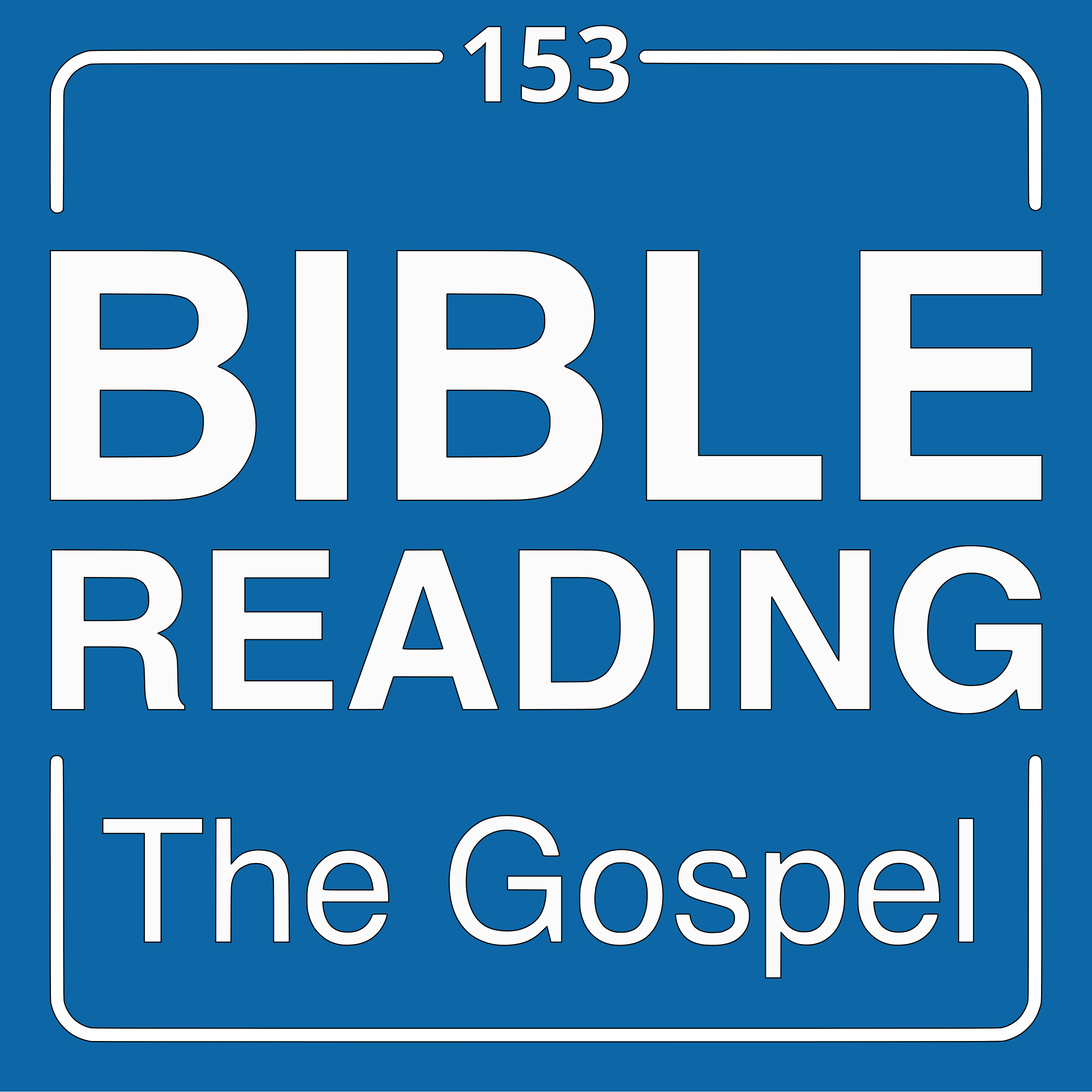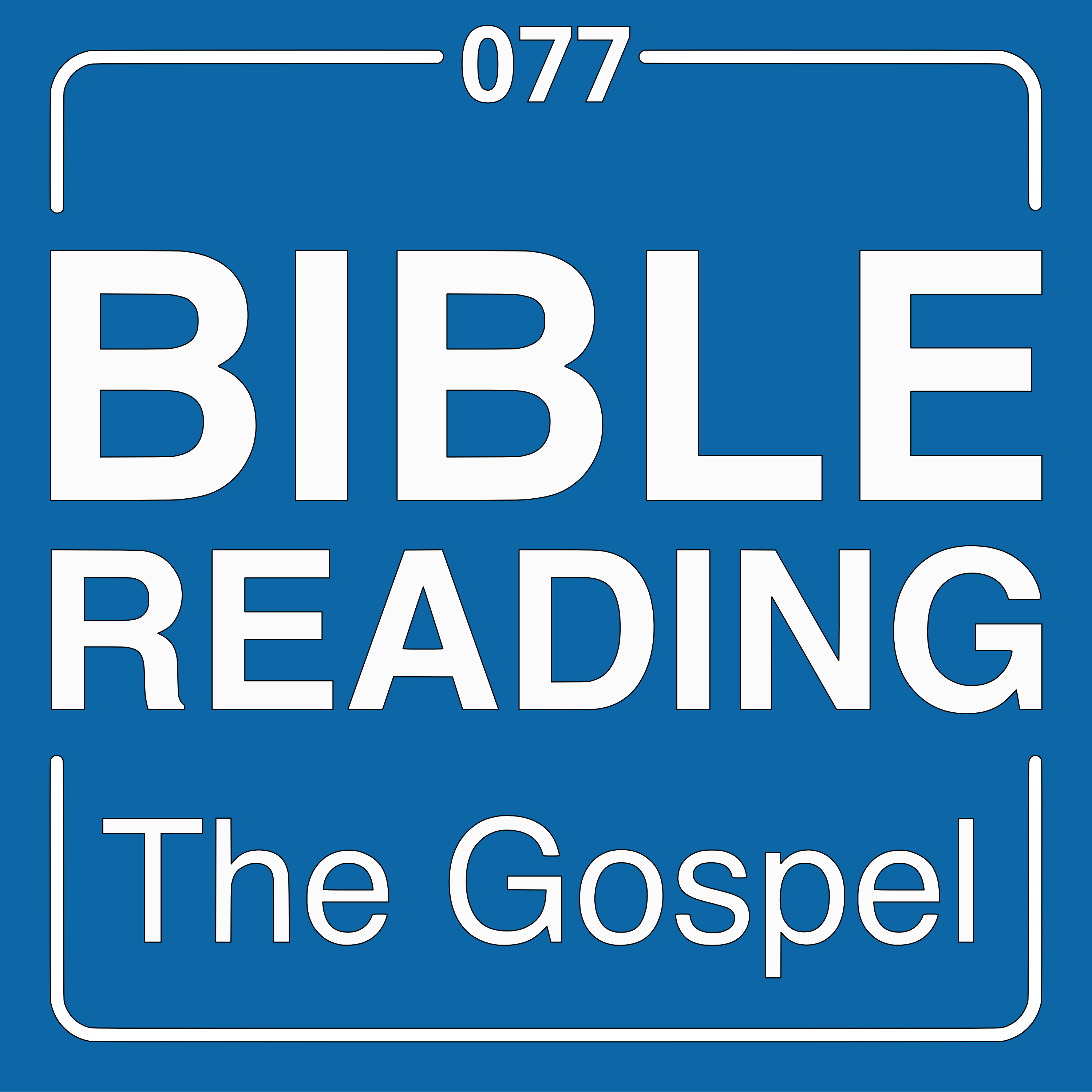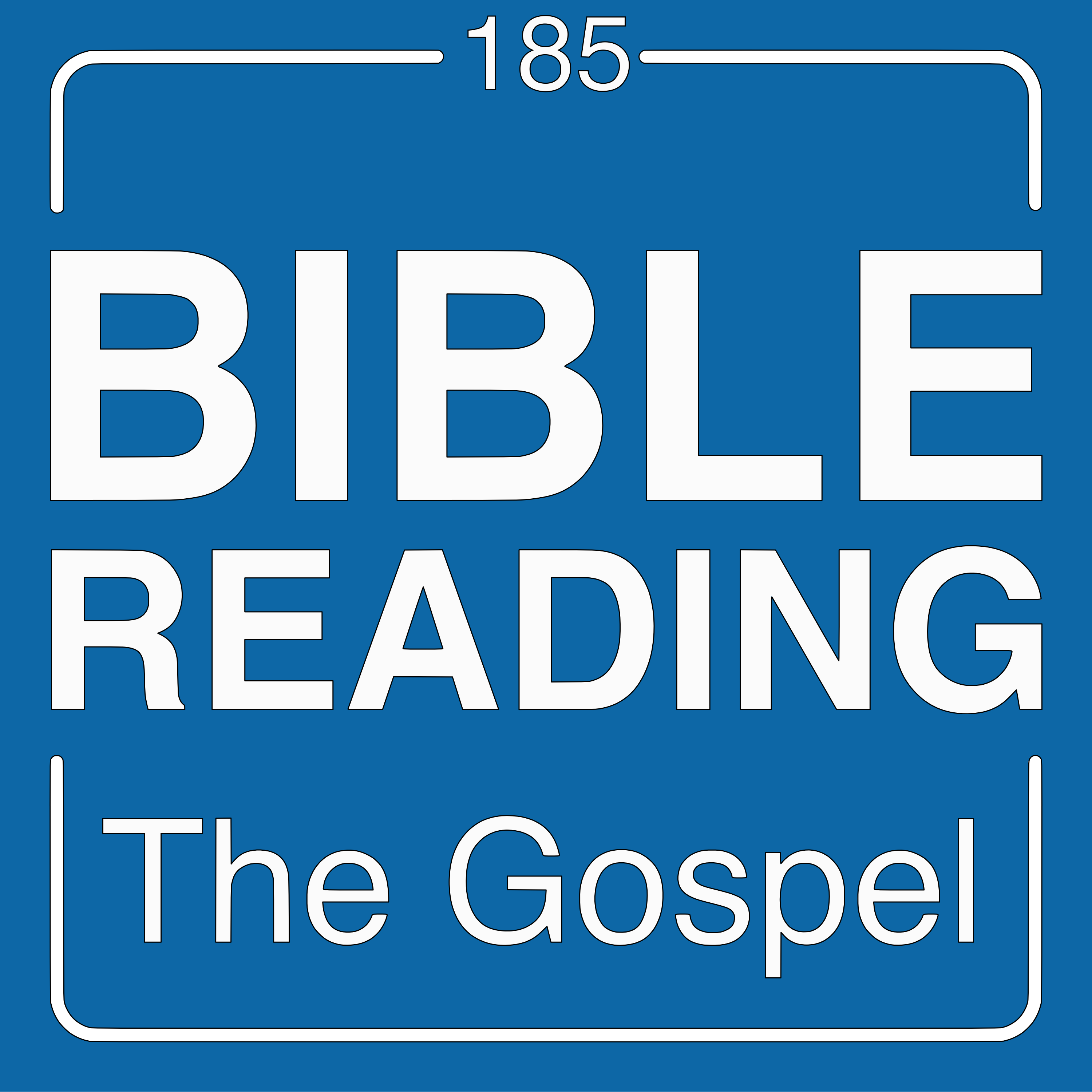Episode Transcript
[00:00:24] Speaker A: Hello. I'm Josh.
[00:00:24] Speaker B: And I'm Gabriel.
[00:00:26] Speaker A: And today on reading the gospel. We are studying the event, the greatest commandment. This is found in the book of Matthew, chapter 22, verses 34 through 40. In mark, chapter twelve, verses 28 through 34. And in Luke, chapter 20, verses 39 through 40. Today we're going to be reading out of the book of Mark, chapter twelve and verse 28. Follow along with us.
[00:00:54] Speaker B: And one of the scribes came up and heard them disputing with one another. And seeing that Jesus answered them well, asked him, which commandment is the most important of all?
And Jesus answered, the most important.
Hear, o Israel, the Lord our God. The Lord is one.
And you shall love the Lord your God. With all your heart. And with all your soul. And with all your mind, with all your strength. The second is, you shall love your neighbor as yourself.
There is no other commandment greater than this.
[00:01:36] Speaker A: And the scribe said to him, you are right, teacher. You have truly said that he is one and there is no other beside him. And to love him with all your heart and with all the understanding and with all the strength. And to love one neighbor as oneself. Is much more than all whole burnt offerings and sacrifices. And when Jesus saw that, he answered wisely. He said to him, you were not far from the kingdom of God. And after that, no one dared ask him any more questions.
I love this story, this event. And I really hope up in heaven that I get to meet this scribe.
It says he's hearing the disputes.
And I kind of think that we just went through two events. Where the Pharisees have tried to trap Jesus. And when they failed, the Sadducees stepped up to try to trap Jesus. And now it sounds like they're arguing.
And I wonder if this is about the resurrection like the previous one. Then they're going off and having a debate about the resurrection. And Jesus is sitting there. And this brings the scribe over.
And so the scribe then asks Jesus this question and gets into this discussion. What is the MOSt important commandment of all? And this isn't the first time Jesus had given an answer similar to this, is it?
Don't we have the rich young ruler. Where Jesus tells him to do the same thing? To love the Lord your God with all your heart, soul and mind. And love your neighbor as yourself?
[00:03:17] Speaker B: To the rich young ruler, Jesus Christ answered in a practical way, listing several commandments from the second tablet in relationship to your neighbor.
[00:03:28] Speaker A: But then he says, oh, I've done this. And Jesus says, well, then go and give all that you have. And sell all you have and give it to the poor. And that's when he walks away.
[00:03:38] Speaker B: Jesus Christ invited the rich young ruler to make one step further, and that was to cut his ties to the old world and to follow Jesus Christ to become one of his disciples.
[00:03:53] Speaker A: So what is the greatest commandment?
[00:03:55] Speaker B: Is to love.
In fact, this is the summary of the Ten Commandments.
The protestant reformers used to talk about the unity and the diversity of the law of God.
The law of God is diverse in its ten specific commandments in regard to ten specific situations of love, of life. Sorry, but in its unity, the Ten Commandments say, you shall love.
[00:04:27] Speaker A: Yeah, I think I've shared this here before. I think of that food pyramid that we had growing up as well. I had grown up as a kid where you had milk and cheese in one area and fruits and vegetables and nuts and grains and eggs and dairy and all that stuff. And I'm thankful that we moved on from that.
But if you think of a pyramid similar to that, that has those tears at the very top. I put love in the universe. God's universal law is love.
And you can break that down, as Jesus did here, into two love God with all your heart, soul and mind, and love your neighbor as yourself. So those two things summarize. Love, love. Excuse me.
And then you can break that down further. Well, how do we do that? Well, that's when you put in the Ten Commandments. The first four focus on loving goddess. The last six focus on loving our neighbor.
We can break it down even further because Jesus comes and he says, well, I told you, you know, the Bible says, thou shalt not murder. But I tell you, if you hate your brother, you have committed a sin. And so it goes down, and it breaks down further and further and further. But ultimately, if we get back to the top, it's about love.
And that's what the focus of our life should be, is to love God and love those around us with all our heart, soul and mind.
[00:06:03] Speaker B: We think alike in many things. But in regard to the pyramid, I have a different picture. In my mind, I have the same pyramid. But for me, love, it's on the bottom because it's the largest. It's the foundation of everything. And everything we do in life should be built on love.
[00:06:22] Speaker A: That's a great way to put it, too. So what I love about this interaction is the scribes response.
So the scribe says to Jesus, you're right.
But he doesn't just parrot back what Jesus said. He adds to it, doesn't he?
[00:06:41] Speaker B: Yeah, it seems that he is addressing Jesus, but talking to himself. He was processing the word of Jesus Christ, internalizing. And I was very surprised the way he answered, you are right, teacher. You have truly said that he is one. There is no other beside him. And to love him with all your heart and all your understanding, all your strength, to love one neighbor as yourself. And now he adds, this is much more than all burnt offerings and sacrifices.
[00:07:20] Speaker A: So he studied the words, he knows what the Bible says, and he's put these together, and Jesus commends him for that.
But it seems like this scribe has another step he needs to take, because Jesus says, you are not far from the kingdom of God.
[00:07:42] Speaker B: He was right there by the door about to make one step or the final step into the kingdom.
He was not far away. But you know, and I'm not talking about this guy. We don't know his final destiny. We don't know if he made that step or not. We're talking about ourselves. Sometimes almost saved is forever lost.
[00:08:09] Speaker A: Yeah. In the story of the prodigal son, the second son, when he comes back and sees the party, he's outside and he doesn't want to go in.
[00:08:19] Speaker B: He's next to the door right there, one step away.
But stubbornly, he remains outside until the end of the story.
[00:08:27] Speaker A: Yeah. And so we have this question when we get a knowledge, and we talked about studying the Bible and what we do with it.
Knowledge is dangerous without application.
And I think this is one thing we need to realize, that it's our job as a Christian not only to learn about God, but then to apply it to our lives.
[00:08:54] Speaker B: Knowledge is power, providing that we apply it, and we apply it in the right way.
Connecting with one of the previous episodes where Jesus Christ told the sadducees that they were reading the scripture without knowing God, without experiencing his power.
We understand that putting the word of God, listening to his voice, applying to our life, this is where the rubber hits the road. And this practical application is very important.
[00:09:30] Speaker A: And I would like to think again, going back to the rich young ruler, Jesus answer to him is, be my disciple.
You have the knowledge, you understand it, you've got it now. Be my disciple. But the ruler goes away here. I think it's probably the same thing. You've got the knowledge now come, follow me.
[00:09:55] Speaker B: And I like Jesus attitude in regard to the riccian ruler and the gospel of Mark. It says, jesus looked at them and loved him.
Here I see these words of Jesus. You are not far from the kingdom of God as coming from his heart. They are very worm practically embracing this guy, loving him, and saying, I wish you would make the final step into the kingdom.
[00:10:23] Speaker A: Yeah.
So God does that to us. He asks us, are you going to take that step into the kingdom? And I found in my life so often taking that step, it's a step of surrender.
It's a step of giving God our lives and giving him who we are, our character, our desires. And when we give that to God, he takes that and he changes who we are. So what is this passage?
What's this telling us about God?
[00:10:58] Speaker B: I see these words, you are not far from the kingdom of God, as being an invitation.
It is like saying, stay close to me. In a couple of days, you are going to see something that you never imagined. The crucifixion of Jesus Christ.
And maybe we don't know the end of this story. Maybe that was the moment when this scribe who was close to the kingdom of God, maybe that was the moment when he changed his mind or the attitude towards Jesus Christ.
In the same way, other people who follow Jesus Christ and got disconnected over a while, they came back in the day of Pentecost, and they were among those 3005 thousand upon thousands, including priests and religious leaders.
And later it was one of the members of the Sanhedrin who was in charge of executing the first christian martyr, Stephen.
He turned around after meeting Jesus Christ on the way to Damascus and became the greatest or the great apostle Paul.
[00:12:17] Speaker A: Have you ever loved someone or something that didn't love you back?
I think about cats. I'm a recently new cat owner. I didn't like cats until my kids found a little kitten in a barn wall and we brought it home.
And yeah, now I love this cat, but the cat selectively loves me. He comes to me when he wants, he's not there all the time like he's on his own. And when he wants to come, it's like four in the morning and he'll come and just punch me until I wake up and just want to spend time with me, not the time I want to spend with him, but I appreciate the gesture.
Whereas my kids and my wife, I love them and they love me back, and it's a wonderful relationship.
And, you know, my wife recently started teaching where I work and so we drive in together. I, I've had some friends say, well, man, I'm so sorry for you. Now you got to spend more time with your family. But for me, it's the greatest thing.
[00:13:21] Speaker B: It's a blessing, it's, oh, yes, I.
[00:13:23] Speaker A: Get to spend time with these people because I love them. I think the same thing about God here, that God loves us so much, and he wants us to love him because in that. That loving relationship, there's a great desire to be together and to be with one another.
[00:13:42] Speaker B: I really like your description because we don't talk about the kingdom of God as a place.
The kingdom of God is a relationship between the king and his followers, us in this situation, and that relationship is based on love.
When we look around us and we see that just a few people really love Jesus Christ, our hearts break for them because we want more people to understand God's love, more people to respond to his invitation, more people to make the final step into the kingdom.
[00:14:20] Speaker A: Yeah, a human mindset. We can get scared away. Well, I don't want a kingdom. But the way God describes it, we are princes and princesses. We are sons and daughters of God. That makes us royalty. It's not that we're peasants doing whatever the king wants. We're part of the family, and God invites us into that relationship. So the scribe needed to take another step, and sometimes we need to take another step as well. Let's pray. Father God, I am so thankful that the kingdom of heaven is not something that we will experience down the road, a physical place. But the kingdom of heaven is a relationship that begins today, this very moment. We can become citizens of the kingdom of heaven, and we can experience that two way relationship, that love relationship.
Father, I pray that if we just have a head knowledge that you help us to surrender it to you and to love you to get that heart knowledge, to take that extra step, I just ask that you draw us close to you. In Jesus name, amen.
[00:15:37] Speaker B: Amen.



